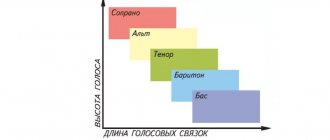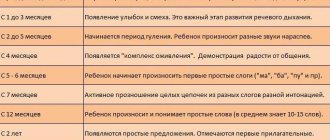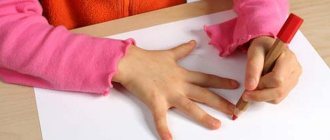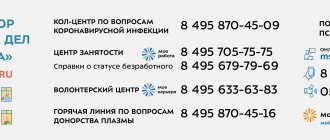As a child grows up, he has to remember more and more information. If memory is poorly developed, the child will have problems studying at school, and as an adult he will experience difficulties at work and in everyday life.
The ability to memorize large amounts of information can be developed with the help of simple exercises. The most important thing is to work with your child regularly; it is best to do this from an early age.
- Word game
- Memorizing objects
How does human memory work?
Memory is a person’s ability to remember, store and reproduce in the mind a set of knowledge, impressions and memories about life events. This is a complex system that includes many brain processes.
Based on the duration of storage and the amount of data, memory is divided into two groups:
- short-term;
- long-term.
Short-term memory allows us to easily remember a limited amount of information for a short period of time (about 30 seconds). The processed information is then forgotten or transferred to long-term memory storage.
Depending on the perception of information, the following types of memory are distinguished:
- figurative – the ability to remember what you see;
- auditory – similar for heard;
- motor – remembering physical movements;
- verbal-logical - the ability to remember and then reproduce at the right moment the sequence of words heard or read;
- emotional – remembering impressions that caused strong positive or negative emotions.
Often these types are combined with each other. For example, a child uses visual-motor memory to copy from the board.
The memorization process happens:
- involuntary – the brain remembers information aimlessly (mechanically);
- voluntary – conscious memorization of the necessary information.
In preschoolers, involuntary memorization predominates. They best remember those objects and phenomena that surprised and interested them, as well as those with which they actively interacted.
Voluntary memory begins to form by the age of 6-7 years. The child begins to make volitional efforts to remember.
Age norms for memory formation at 8-11 years old
As noted above, each child’s age has its own standards for memorizing and assimilating information coming from the outside world.
Thus, we can highlight the following features of memory formation in children aged 8-11 years:
- At this stage, there is an active development of voluntary memory - the student begins to set himself a special task to learn certain information. Moreover, the processes of memorization and reproduction act as mnemonic actions,
- gradually the child begins to master memorization techniques. At first, he uses simpler techniques, for example: reviewing the material, repeating it many times, dividing information into smaller blocks,
- self-monitoring of memorization results is carried out at the level of recognition. For example, a student looks at a story and thinks that he has learned it because it seems familiar to him,
- younger schoolchildren (8-11 years old) have more developed figurative memory.
REFERENCE. Parents should keep in mind that if a child has problems remembering this or that material, measures to improve memory should be adjusted taking into account his age and the standards established in medicine.
General recommendations for memory development in children
To achieve significant results, you need to systematically train your memory. You need to practice constantly, then the effect will be maximum.
All memory development activities in children should be conducted in a playful way so as not to cause rejection.
Story about the past day
Ask your child to tell you about his day at kindergarten or school. This is a great way to train your memory and the ability to build a chronology of events.
First, ask your child leading questions - for example, what classes were there, what was served for breakfast and lunch, and so on. Ask for details to teach you to remember details like the color of a doll's dress or a friend's clothes. Over time, the child will learn to describe the past day in detail.
Reading and retelling
Be sure to read fairy tales and stories to your child, and then ask him to retell the events and express his attitude. It has a beneficial effect on memory and memorizing small poems; you can start with one or two quatrains.
When your child learns to read on his own, be sure to discuss what he has read with him. During the story, he will train his memory, expand his vocabulary and improve his communication skills.
Studying of foreign language
Scientists have proven that the easiest and most effective way to learn a foreign language is from childhood. If you and your child learn 5-7 new words a day, this will also be excellent memory training. Be sure to practice repeating what you have learned earlier so that the words are not forgotten.
Sports activities
Sports exercises and any physical activity contribute to the development of motor skills and also improve the supply of oxygen to the cerebral cortex. It is not necessary to attend gymnastics or acrobatics classes. Let the child ride a bike, learn to roller skate, and learn to swim.
The right diet
Be sure to give your child foods that stimulate the brain hemispheres. These are salmon and other fatty fish, eggs, walnuts, carrots, dark green vegetables, bananas.
Tips from teachers
If you want to help your child become more attentive and improve his memory, then you should conduct classes with him, following certain rules:
It is important to select materials for games and exercises that are appropriate to the age of the children. It is worth choosing simpler and shorter tasks for hyperactive children, as such activities are difficult for them. You need to play one or two games at a time, no more. Keep kids interested in each new exercise by using attractive pictures and toys. Musical games and tasks can be used to develop attention and memory. For example, repeat a given rhythm or identify the sounding instrument. Praise children not only for their successes, but also for their efforts. Consistent and regular games to develop attention for preschoolers will certainly bring excellent results
Children love them and benefit them greatly!
Consistent and regular games for developing attention for preschoolers will certainly bring excellent results. Children love them and benefit them greatly!
Specialized techniques
To achieve the maximum effect, you need to develop memory using proven techniques and exercises selected in accordance with the child’s age. The most popular of them are the Glen Doman method and the Montessori method.
The Doman method is designed for children from approximately 6 months to three to four years. The essence of the method is that the child is shown an image with a caption and the words are spoken. Each lesson lasts a few minutes, you need to practice 3-5 times a day.
The Doman method has a number of features:
- classes are conducted in a comfortable environment;
- use a variety of materials for training;
- classes “through force” are unacceptable;
- the learning process must be regular and continuous;
- The activity is stopped before the baby gets tired and starts acting up.
The development of memory and attentiveness according to the Montessori system is that parents must give the child freedom within established boundaries. This means that the baby himself chooses from the available options for play exercises what he will do at the moment.
We carry out tests
You can test your ability to memorize, store and reproduce information yourself. There are several simple memory tests for this:
Luria test. This research technique will show how developed a child’s voluntary memory is; it is the most important element of the learning process. Conduct testing in a calm environment, preferably in a quiet room so that the child is not distracted. Ask your child to sit comfortably and try to remember the words. Call without undue haste (with a pause of 2-3 seconds) ten words that the child knows well, but they should not be logically connected. Example: cat, school, spoon, swing, forest, jam, car, sea, milk, elephant.
Then repeat the verbal series and give it a second try, this will give you the opportunity to understand which words the child “fixed” in his head in the second place. Thank him and postpone continuing the test until later. After an hour and a half, ask the child to remember what words you named, this will make clear the state of the ability to reproduce new information (delayed memorization).
If a child remembers 3-4 words on the first try, this indicates a normal ability to memorize. On the second attempt, a child with normal memory should reproduce at least 6-7 words. After an hour, the child should remember at least 6 words. With high memory abilities, the child will be able to name from 8-10 words after the second attempt, and with low levels - from 0 to 2.
Memory training in children 2-6 years old
This is a period of active formation and development of memory; children become “why-seekers” - they are interested and curious about everything that surrounds them. They learn letters and numbers, master reading, writing, and arithmetic operations.
At this age, involuntary memorization predominates, so information with a plot and emotional overtones is better remembered. Kids practically do not perceive dry facts.
The Doman technique at this age is used both for memorizing new words and for playing games. For example, you can ask your child to find an extra element among the cards or combine images into groups based on some characteristic.
To help your child remember information faster, teach him mnemonics methods - for example, the method of associations. Ask the child to name what he associates this object with, and then, when trying to remember, prompt the association.
Be sure to include play exercises to develop memory in your baby’s daily schedule. Some of them are given below.
Word game
Tell your baby a few words and ask him to repeat them. Over time, complicate the task - increase the number of words, ask them to repeat them, maintain order.
Finding differences
Show your child pictures with similar images and ask him to find the differences. This exercise trains memory, develops attentiveness and the ability to concentrate.
Purchases
When you go to the store, ask your child to remember a list of 3-5 products. And in the store, give them the task of remembering them. The task can be complicated by increasing the number of positions.
If your child doesn't like an exercise, don't insist on doing it. Offer him a choice of any other task from those that arouse interest.
What types of memory exist
Motor memory
develops first in the newborn. It helps the baby learn to sit, crawl, walk, and hold a spoon or toy.
Emotional memory
at the beginning of life it is more of a reflexive nature: the parent is nearby - the baby is calm, the parent is far away - the baby is lonely. And only by six months does the child begin to remember emotions more consciously and may burst into tears if you show him a toy with which he accidentally hit himself in the face the day before. During this period, the baby easily recognizes family members: he sees his mother and smiles, but he is unlikely to smile at strangers. It is emotional memory that makes recognition possible.
Source: giphy.com
Figurative memory
is formed in babies closer to the age of one year. They not only remember tastes, touches or images, but also create associations associated with these memories. Through figurative memory, the child forms his ideas about the world.
Verbal-logical memory
helps the child formulate and reproduce thoughts. However, this type of memory begins to work if the baby has learned to speak at least 10–20 words.
Short-term memory
Each child has its own volume, since this is an individual ability given by nature. It remains for life virtually unchanged. Short-term memory allows you to perceive new data, immediately sort it and leave only what is needed.
Long-term memory
- the place where data received from short-term memory is sent. This type of memory develops in some children before one year of age, and in others a little later.
RAM
necessary to save temporary information. For example, when we add two numbers in our heads, we leave the intermediate sum after adding the tens “in our minds.”
How to improve the memory of a child 6-12 years old
Starting school is a difficult period in a child’s life. Many new demands are placed on him, and the amount of information to remember increases sharply. If you did not develop your child’s memory at an earlier age, you should start doing this at six or seven years old and continue thereafter. Academic performance not only in elementary school, but also in high school depends on this.
The greatest effect at this age comes from influence from several sides at once:
- educational games;
- reading and retelling books;
- studying of foreign language.
Combine these methods, but choose those activities and tasks that arouse keen interest in the child. Developing memory “under pressure” will not give any effect.
To develop the memory of a child aged 6-12 years, you can also eat your own exercises.
Memorizing objects
Show your child a drawing that shows several objects and give them 15-20 seconds to memorize. After this, turn the paper over and ask him to list what was depicted. You can also draw all these items again on a new sheet.
Finding differences
At this age, pictures to find differences should contain many small details. Such tasks train not only memory, but also attentiveness.
Causes of poor memorization
In practice, there are often cases where a child has memory impairment. This condition is characterized by the inability and inability of the child to preserve, accumulate and use information received by the child when interacting with the outside world.
There are many reasons for the development of this pathological condition. The following are the most common factors that negatively affect the development of memory in a child 8-11 years old, namely:
- constant stress and overwork, which negatively affect the general psychophysical state of the child,
- previous somatic diseases, as well as a consequence of seasonal hypovitaminosis,
- unsuccessful vaccination in early childhood,
- traumatic brain injury suffered by the child,
- development of various lesions in brain structures, including tumor growth,
- diagnosed delay in speech and general development,
- manifestation of acute and chronic circulatory disorders in the head, atherosclerosis, spasm of cerebral vessels and other pathological changes.
ATTENTION. It should be noted that in most cases, poor children's memory can be corrected and improved. In this case, in no case should this moment be ignored, since in the future poor memorability can lead to the development of psychosomatic, neurological and psychological problems in the student.
Educational games to improve memory - on the IQClub website
To develop memory, not only exercises are used, but also games. IQClub is an Internet service that offers educational games for training a child’s memory, attention, reading skills, and thinking. To use the services of this online portal, you need:
- register in the system;
- for a child to take a test that interests him.
After this, IQClub specialists will select an individual training program for your child, based on an analysis of his strengths and weaknesses.
Game development is carried out by a team of professionals - the best psychologists, teachers, designers.
Parents can track learning results online. Useful games on the IQClub website are an excellent simulator for developing a child’s intelligence.
What to consider when selecting exercises
Psychologists, as in the case of the development of other types of memory, recommend first of all taking into account the child’s age. Words for preschool children should be short, consisting of 1-2 syllables. They should represent well-known objects.
These may include:
- House;
- Forest;
- Cat;
- Snow;
- Book and other similar words.
When voicing, it is important to speak calmly, pronouncing all sounds clearly. The break between words should be no more than 3 seconds. This is the time it takes to repeat the word you heard in your mind.









